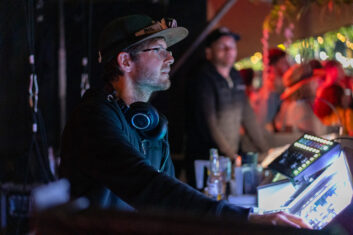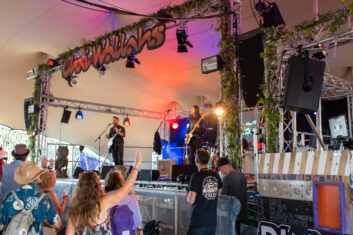It would be reasonable to say that the omens going into this year’s festival schedule were not especially auspicious. Some events were proving slower to sell than usual, while there was uncertainty over whether others would take place. And then in the spring there were warnings from multiple quarters about the possibility of events being downsized or cancelled outright.
While some of the bleaker forecasts did not come to pass, it’s also true to say that 2023 has seen its fair share of logistical problems. News reports about events having to be shortened, downsized or scrapped – not least due to extreme weather – seemed more frequent than in previous years. Supply chain and recruitment issues were also relatively widely reported, indicating that, along with accelerating climate change, the industry has cause to think more carefully about how events might have to be organised five or ten years from now. There were also signs that newer acts are finding it harder to make festivals work for them financially.
RESOURCE PROBLEMS
Nonetheless, on an individual company level, it appears that many vendors and hire/service providers have had a very good spring and summer, especially where they have taken steps to pre-empt possible resource problems. Hence the summary provided by Austin Freshwater, managing director of audio mixing innovator DiGiCo, is not untypical.
 “The events we have been on-site for have maintained their popularity, attracting large crowds as usual,” he says. “In terms of logistics, availability of equipment and crew, it is important to note that the past two summers have been incredibly busy, especially at larger events and festivals, leading to some stretched resources. However, even though these were still in existence it was to a much lesser degree compared to 2022. It seems that companies were well-prepared and anticipated this factor, allowing for smooth operation.”
“The events we have been on-site for have maintained their popularity, attracting large crowds as usual,” he says. “In terms of logistics, availability of equipment and crew, it is important to note that the past two summers have been incredibly busy, especially at larger events and festivals, leading to some stretched resources. However, even though these were still in existence it was to a much lesser degree compared to 2022. It seems that companies were well-prepared and anticipated this factor, allowing for smooth operation.”
Jack Page, education application support at d&b audiotechnik, highlights a hectic summer characterised by the use of its immersive audio solution, Soundscape, at events including WOMAD (on the eponymously-named d&b Soundscape Stage) and the Houghton Festival (see page 22 for our immersive futures feature). “I’d say the level of demand for d&b at festivals is the same, if not more, as it was before the pandemic. The sector has come back with a vengeance, it’s fair to say, and all of our partners have been extremely busy with festivals.”
SUPPLY DISRUPTIONS
Still, as a casual observer, it’s not been hard to form the opinion that there are now multiple issues that will come to influence the longer-term future of festivals. In particular, extreme weather has impacted upon a significant number of events, from Cheshire in the UK – where Sunday-only tickets to Bluedot were cancelled as a result of sustained heavy rain – to Burning Man in the US Nevada desert, where patrons were obliged to conserve food and water after flash-flooding turned the site into a muddy quagmire.
There was also confirmation across geographies that supply chain and recruitment are continuing to challenge organisers – in some cases, leading to rather short-term changes of plan. For instance, just as this article was being finalised, news broke that the 100,000+ attendance Electric Zoom EDM festival in New York had scrapped its Day 1 schedule with only hours to go due to “supply chain disruptions” hindering the construction of its main stage.
The cost of living crisis and general economic factors were also widely referenced, with a recent roll-call of UK festival cancellations compiled by the We’re Going On An Adventure website revealing them to be a factor in the scrapping of events including Doune the Rabbit Hole in Stirlingshire, Beyond Festival in Leicester, and the Keswick Mountain Festival.
Whilst an awareness of the impact that climate change is likely to have on the festival calendar in future is undoubtedly present, the general consensus is that equipment and resource availability are currently the most habitual challenges, especially with organiser schedules becoming more compressed (more of which anon). Although even here, companies which have sizeable inventories can be well-safeguarded against late requests and changes of plan.
 Frank Cheshire runs South West Backline, a long-established audio supplier to festivals including Mucky Weekender – which takes place in Winchester every year in the second week of September – Boardmasters, and the Glade and Silver Hayes areas at Glastonbury. In general, he observes an increased tendency in the industry for orders to be placed later on, but says that “it’s not really been an issue for us because we carry such large stocks of equipment, [including] 40-60 drum kits, 80+ guitar amps, lots of DJ equipment, consoles and so on. Now if we had needed to go out and locate [extra equipment at short notice], there would have been a problem, but fortunately that wasn’t the case.”
Frank Cheshire runs South West Backline, a long-established audio supplier to festivals including Mucky Weekender – which takes place in Winchester every year in the second week of September – Boardmasters, and the Glade and Silver Hayes areas at Glastonbury. In general, he observes an increased tendency in the industry for orders to be placed later on, but says that “it’s not really been an issue for us because we carry such large stocks of equipment, [including] 40-60 drum kits, 80+ guitar amps, lots of DJ equipment, consoles and so on. Now if we had needed to go out and locate [extra equipment at short notice], there would have been a problem, but fortunately that wasn’t the case.”
It’s long been the company’s approach to maintain this level of inventory. “It makes life a lot easier and a lot less stressful if you can go out into the warehouse and physically touch what has been asked for, says Cheshire. “It also makes it easier for customers, who might otherwise have to go to several companies to get what they need, which creates extra workload for them.”
Asked to consider whether he thinks more companies might boost their inventories in the wake of persistent supply chain challenges, Cheshire responds: “I think that the companies who aren’t carrying the [large amounts of] inventory are either doing so because of the financial implications of having the stock or the storage implications of doing so. The fact that we do have [a good amount] of storage space does make a difference.”
BUSY SUMMER
Harry Bishop, owner/director of HPA, has moved his business from a complete production focus to dry hire in the last few years. He’s had a “very busy” summer hiring his inventory – which includes “beautifully musical” loudspeakers from his new favoured brand, TW AUDiO – to a long list of festivals, including Kendal Calling, Boardmasters, Green Man and Shambala (the 2023 edition of which was overshadowed by the tragic death of poet Gboyega Odubanjo, who had been due to perform on the festival’s final day). The specific issue he highlights with regard to kit is one of rising costs and how those are accommodated down the chain.
“My observation is that, in general, there is a tendency for people to want the same kit that they had pre-pandemic and for the same price, which isn’t possible as the cost of everything has gone up. So the big question is essentially ‘who takes the hit?’” says Bishop, adding that one way in which some events have sought to reduce overheads has been to “pare back on things a bit” in terms of staging and equipment. In general, though, “I wouldn’t say there has been much change operationally in terms of how people are approaching events this side of the pandemic.”
 One very positive reason for the increase in costs is that – following many years of stagnation – there has been a discernible elevation in rates for technical crew after the Covid hiatus. “It takes years to get up to speed and be a proper, proficient engineer, so the increase in rates that has occurred is a very good thing,” says Bishop, adding that average rates of £150/200 per day had remained unaltered for a long time, with even a role as head engineer on a corporate job unlikely to elicit a daily fee of more than £250.
One very positive reason for the increase in costs is that – following many years of stagnation – there has been a discernible elevation in rates for technical crew after the Covid hiatus. “It takes years to get up to speed and be a proper, proficient engineer, so the increase in rates that has occurred is a very good thing,” says Bishop, adding that average rates of £150/200 per day had remained unaltered for a long time, with even a role as head engineer on a corporate job unlikely to elicit a daily fee of more than £250.
Given the continuous rises in the cost of living, the previous stagnation meant that “in real-terms rates were going down, so the fact that we often now have rates that are more like £350 per day is great. It’s high time that happened, although I think also a lot of people left the industry [during the pandemic], so there is a supply and demand dimension in there, too”.
TALENT LOSS
The loss of talent – and ensuing (re)configuration of roles – is also having some impact on vendors. Bertram Zimmermann, product manager at Sennheiser, observes that the “departure of technical people” in the live sector encourages manufacturers to “think more intensely about how to address that, for example with the automation of some things, easier workflows, and more easy to use products so [less skilled technicians] can have the ability to use a system without years of experience in RF.”
Whilst acknowledging that there been a loss of freelancers in some areas of the business, Cheshire says it’s not an issue that has affected his operation: “Some of our people changed roles and moved around, but they didn’t leave the industry.”
Instead, the greatest logistical challenge he identifies is a marked compression of timescales. “The planning time [for events] has got smaller,” he confirms. “So what would previously have started planning in November may not start now until April. There’s definitely more work to be done in a shorter space of time.”
South West Backline’s aforementioned levels of inventory have been useful in this regard, as well as for the increased tendency for orders to be placed last-minute. “This year we had a few instances where people were confirming orders two days before they wanted them delivered, which was previously unheard of,” says Cheshire. “That has led to a few situations where a customer has said ‘yes’ to an alternative, which is always a close alternative, because they understand the situation and realise they [have to be pragmatic] if they are ordering so near to the event.”
WARNING SIGNS
If the above observations indicate that suppliers and technology partners will need to remain responsive and flexible in the future, then that should come as no great surprise; things had been moving in that direction for some time anyway. But there are a few other trends to be borne in mind as attention starts to shift to the 2024 calendar.
 Cheshire indicates that a high current level of pre-sales for next year’s events could be grounds for concern. “I think there are a number of festivals perhaps now looking to cover current costs by pre-selling next year’s tickets – something that I have always considered to be a bit of a warning sign,” he says. “If someone is pre-selling heavily for next year, then it tends to indicate that this year has not been quite as good as they were hoping.”
Cheshire indicates that a high current level of pre-sales for next year’s events could be grounds for concern. “I think there are a number of festivals perhaps now looking to cover current costs by pre-selling next year’s tickets – something that I have always considered to be a bit of a warning sign,” he says. “If someone is pre-selling heavily for next year, then it tends to indicate that this year has not been quite as good as they were hoping.”
There are also some growing question marks over the future programming of festivals. A recent Guardian article highlighted the increasing number of acts – some well-established – who are reluctantly passing on festival appearances due to a rising cost-base already badly exacerbated by Brexit and the energy crisis. The potential impact of this should not be underestimated given that many of the larger acts who have routinely headlined festivals over the past 20 years are now heading towards retirement – a non-negotiable generational shift that means we are also likely to see fewer mega-festivals in the future.
POSITIVE LIGHT
Of course, it is possible to view some aspects of this in a positive light since they will surely prompt more innovation by festival producers. As Page notes, “I think that the increase in the use of [immersive audio] at festivals this year shows there is a real desire to create experiences for visitors, and I imagine that will expand further as festivals evolve and change.”
DiGiCo’s Freshwater says the company recognises that there will be “an ongoing mix of large and smaller/niche events in the future. That’s great as it offers people different types of experiences, either seeing their favourite artist or discovering a new band. As an industry, whether as a manufacturer or supporting a rental company, we have always been able to commit and adapt to the requirements of the market, promoter and organisers.”
Indeed, if the last few years have told us anything, it’s that pro AV has invariably adapted well to sometimes dramatic changes and still managed to keep festivals on track. That alone should serve the industry well as it’s beyond doubt that the underlying audience appetite for the communal festival experience remains very robust.







